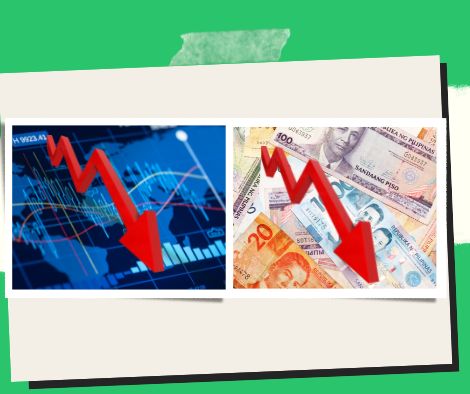
Peso and stocks decline as January inflation reaches 8.7%.
The major index of the local stock exchange continued to fall on Tuesday in part as a result of the acceleration of domestic inflation, which reached a 14-year high of 8.7 percent in January. The peso also underperformed on Tuesday.
To reach 6,881.26 points, the Philippine Stock Exchange index (PSEi) lost 0.80 percent or 55.35 points.
All Shares then dropped 18.93 points, or 0.52 percent, to 3,655.75 points.
The majority of sectoral indexes, including Services (1.53 percent), Property (0.95 percent), Financials (0.94 percent), and Industrial (0.84 percent), likewise ended the day in the red.
Holding Companies saw a 0.10 percent increase, while Mining and Oil saw a 0.52 percent increase.
1.03 billion shares, or PHP6.14 billion, were traded.
According to Luis Limlingan, head of sales for Regina Capital Development Corporation (RCDC), “Philippine equities slumped, pushed by rising inflation and US (United States) bond yields as investors braced for the latest remark due Tuesday from Fed (Federal Reserve) chairman Jerome Powell.”
The nation’s annual inflation rate increased this January from 8.1 percent to 8.7 percent, a new 14-year high, led by increases in the housing, water, electricity, gas, and other fuel indices.
It went above and beyond the projected peak in December.
Stocks rose as a result of the markets’ interpretation of Powell’s disinflation remarks from the post-meeting news conference last week, according to Limlingan.
Many believe Powell will use the appearance to clarify statements made following last week’s 25 bp rate adjustment or to provide additional clarity on where rates are headed, he continued.
According to Limlingan, oil prices increased “as investors projected a recovery in demand from China in connection to supplying issues and fears of slower development in major nations curtailing consumption.”
West Texas Intermediate (WTI) crude oil futures rose by 1% to USD74.11 per barrel, while Brent crude oil futures jumped by 1.3 percent to USD80.99 per barrel.
The local currency was impacted by the PSEi’s decline once more when it dropped to 55.085 to the dollar from its previous close of 54.39.
It started the day at 54.65, which was lower than the previous session’s opening price of 54.15.
It fluctuated in price between 55.1 and 54.6, yielding a mean of 54.848.
Volume increased to USD1.27 billion from USD1.05 billion the day before.
Michael Ricafort, the chief economist at Rizal Commercial Banking Corporation (RCBC), attributed the peso’s performance, among other things, to the higher-than-anticipated January 2023 domestic inflation rate, the US dollar’s ongoing decline, a wait-and-see attitude before Powell’s speech to the Economic Club of Washington later in the day (Manila time), and geopolitical tensions between the US and China.
According to Ricafort, the currency pair will trade on Wednesday between 54.90 and 55.20 to the US dollar.
Save/Share this story with QR CODE
Disclaimer
This article is for informational purposes only and does not constitute endorsement of any specific technologies or methodologies and financial advice or endorsement of any specific products or services.
 Need to get in touch?
Need to get in touch?

We appreciate your reading. 
1.) 

Your DONATION will be used to fund and maintain NEXTGENDAY.com
Subscribers in the Philippines can make donations to mobile number 0917 906 3081, thru GCash.
3.) 
4.) 
AFFILIATE PARTNERS

World Class Nutritional Supplements - Buy Highest Quality Products, Purest Most Healthy Ingredients, Direct to your Door! Up to 90% OFF.
Join LiveGood Today - A company created to satisfy the world's most demanding leaders and entrepreneurs, with the best compensation plan today.

 Business, Finance & Technology
Business, Finance & Technology

 Business Technology, Finance Technology & Information Technology
Business Technology, Finance Technology & Information Technology





